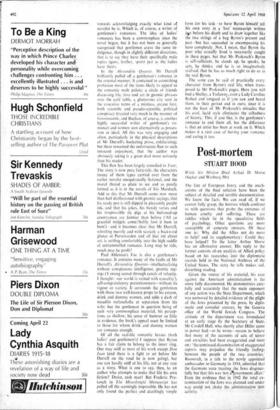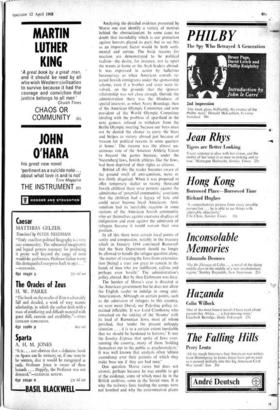Post-mortem
STUART HOOD
The fate of European Jewry and the mech- anisms of the final solution have been the subject of detailed and terrible documentation. We know the facts. We can read of, if we cannot fully grasp, the horrors which confront us with questions that probe the extremes of human cruelty and suffering. These are riddles which lie in the speculative fields of psychology. Other questions are more susceptible of concrete answers. Of these one is: Why did the Allies not do more to help? and its supplementary: Could they have helped? To the latter Arthur Morse has an affirmative answer. His reply to the former consists of ,an analysis of Allied policy based on his researches into the diplomatic records held in the National Archives of the United States. The story he tells makes sad, disturbing reading.
Given the source of his material, his case against the American administration is the more fully documented. He demonstrates care- fully and accurately that the main opponent of any action was the State Department, which was unmoved by detailed evidence of the plight of the Jews presented by the press, by diplo- matic and consular sources, by the Geneva office of the World Jewish Congress. The attitude of the department was formulated at an early stage by the Secretary of State, Mr Cordell Hull, who shortly after Hitler came to power had—so he wrote—reason to believe that many of the accounts of acts of terror and atrocities had been exaggerated and went on : 'the continued dissemination of exaggerated reports may prejudice the friendly feelings between the people of the two countries.' Roosevelt, in a talk to the newly appointed ambassador to Germany in 1934, admitted that the Germans were treating the Jews disgrace- fully but that this was 'not alhovernment affair.' Even the evidence that in 1942 the total ex- termination of the Jews was planned and under way could not shake the administration into activity. Analysing the detailed evidence presented by Morse one can identify a variety of motives behind the obstructionism. In some cases no doubt that incredulity which is our protection against horrors played its part; but to see this as an important factor would be both senti- mental and untrue. The basic reasons for inaction are demonstrated to be political realism—the desire, for instance, not to upset the WASPS at home or the Arab leaders abroad. It was expressed in action by ludicrous bureaucracy as when American consuls re- jected Jewish immigrants under the sponsorship scheme, even if a brother and sister were in- volved, on the grounds that the sponsor relationship was not close enough. Outside the administration there was the blindness of special interests, as when Avery Brundage, then of the American Olympic Committee and now president of the World Olympic Committee (dealing with the problem of apartheid in the next games), refused to withdraw from the Berlin Olympic meeting 'because our boys must not be denied the chance to carry the Stars and Stripes to victory abroad just because of treason for political reasons in some quarters at home.' The treason was the almost un- animous vote of the Amateur Athletic Union to boycott the games because, under the Nuremberg laws, Jewish athletes, like the Jews, had been deprived of their rights as citizens.
Behind all this the reader becomes aware of the ground swell of anti-semitism, more or less thinly disguised. When it was proposed to offer temporary shelter to twenty thousand Jewish children there were protests against the admittance of 'potential communists,' assertions that the children had a legacy of hate and could never become loyal Americans. Anti- semitism had its inevitable reaction in some sections of the American Jewish community who set themselves against excessive displays of indignation and even against the admission of refugees because it would worsen their own position.
In all this there were certain focal points of sanity and compassion, notably in the treasury which in January 1944 convinced Roosevelt that the State Department should no longer be allowed to handle the refugee question alone, `the matter of rescuing the Jews from extermina- tion [being] a trust too great to remain in the hands of men who are indifferent, callous and perhaps even hostile.' The administration's policy altered. But by then Eichmann was busy.
The burden of Morse's case is directed at the American government but he does not allow the English reader to indulge in smug anti- Americanism. Although on certain points, such as the admission of refugees to this country, we were more liberal, our Palestine policy re- mained inflexible. It was Lord Cranborne who remarked on the sinking of the 'Struma' with its load of Rumanian Jews, most of whom perished, that 'under the present unhappy situation . . . it is to a certain extent inevitable that we should be hardened to horrors.' It was the Sunday Express that spoke of Jews over- running the country, many of them 'holding themselves out to the public as psychoanalysts.' It was well known that analysts often 'obtain ascendancy over their patients of which they make base use if they are bad men.'
One question Morse raises but does not answer, perhaps because he was unable to get at the evidence, some of which must lie in the British archives, some in the Soviet ones. It is why the railways lines feeding the camps were not bombed and why the extermination plants were not destroyed from the air. Were these not as important targets as Dresden? Did the Russians obstruct the operation by denying landing facilities? To those inmates who sur- vived it is a continuing puzzle, one example of that silence and inaction that goes to explain the passivity of the victims. They felt them- selves abandoned. A cry of compassion, Morse says, would have reached the Jews in the ghettoes and death camps. They might have summoned up some final reservoir of defiance on the step of the gas chamber.












































 Previous page
Previous page